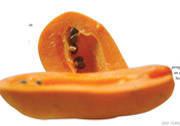Health Topics
-
Healthy Living
-
|
|
Aphrodisiac Foods
|
|
Dr E Suneetha
|
 |
The moon is nothing But a circumambulating aphrodisiac Divinely subsidised to provoke the world into a rising birth-rate:- ChristopherFry, A Sleep of Prisoners |
|
| |
Every known human culture, in the pursuit of sexual success and fertility, indulged in a search for aphrodisiacs. Stories and legends from the past have told us of various plants, spices and foods that seemed to act as sexual stimulants. Nearly 5,000 years ago, Charaka, the father of ayurvedic medicine, claimed that garlic lightens the blood, reduces tumours, and is an aphrodisiac tonic. History is rife with the human pursuit of aphrodisiacs in many forms.
|
|
What is an Aphrodisiac?
An aphrodisiac is a food, drink, drug, scent, or device that, promoters claim, can arouse or increase sexual desire, or libido. Named after Aphrodite, the Greek goddess of sexual love and beauty, the list includes hundreds of items. Collectively, these compounds, regardless of their sources, are known as aphrodisiacs. Aphrodisiacs were first sought out as a remedy for various sexual anxieties including fears of inadequate performance as well as a need to increase fertility.
Procreation was an important moral and religious issue, and aphrodisiacs were sought to insure both male and female potency. |
|
|
Why Certain Foods
It has been suggested that man’s universal attribution of libidinous effects to certain foods originated in the ancient belief in the therapeutic efficacy of signatures: |
| Substances |
Why |
| Bulbs, eggs, snails, etc |
Representative of ‘seed or semen’ which were considered inherently to have sexual powers
|
| Ginseng root and powdered rhinoceros horn |
Physical resemblance to genitalia |
| Chillies, curries, and other spicy foods |
Physiological effects of a raised heart rate and - sometimes – sweating, which are similar to the physical reactions experienced during sex |
| Chocolate |
Based on their rarity of availability and therefore associated mystery (in earlier days) |
| Sparrows |
Mythological connotation of Aphrodite, the love goddess, considering them ‘sacred’ because of their ‘amorous nature’ |
|
| |
|
How they work
Can certain foods, drugs and scents really increase sexual desire? Millions of people swear they can, but the scientific evidence is still in question. “The mind is the most potent aphrodisiac there is,†says John Renner, founder of the Consumer Health Information Research Institute (CHIRI). “It’s very difficult to evaluate something someone is taking because if you tell them it’s an aphrodisiac, the hope of a certain response might actually lead to an additional sexual reaction.â€
Experts say that aphrodisiacs can work in two ways: There are those that create sexual desire by working on the mind, and there are those that create desire by affecting parts of the body. For example, something that increases blood flow in the sex organs might simulate the feeling of sexual intercourse and have the effect of creating desire. Likewise, there are things that can make our body produce more of the chemicals associated with sexual desire. Something that lowers inhibitions in the mind, such as alcohol or marijuana, might also create (or allow) the desire to have sex. Sometimes, just thinking something is an aphrodisiac makes it appear to work as one.
It’s possible that historic claims about the aphrodisiac effects of certain foods or supplements could have held more truth at the time than they do today because overall nutrition wasn’t as good then. Whether these sexy treats have the magical, mood-enhancing properties ascribed to them or not, it is certain that certain foods boost the immune system and are chockfull of nutrients and vitamins such as B and E that enhance our physical well-being and good looks.
After all, isn’t attractiveness generally associated with the vibrant skin and fit look that comes from eating a healthy diet? A good diet, physical and mental health and a regular exercise program are a more dependable path to better sex than are goats’ eyes, deer sperm, and frogs’ legs.
|
|
|
| |
|